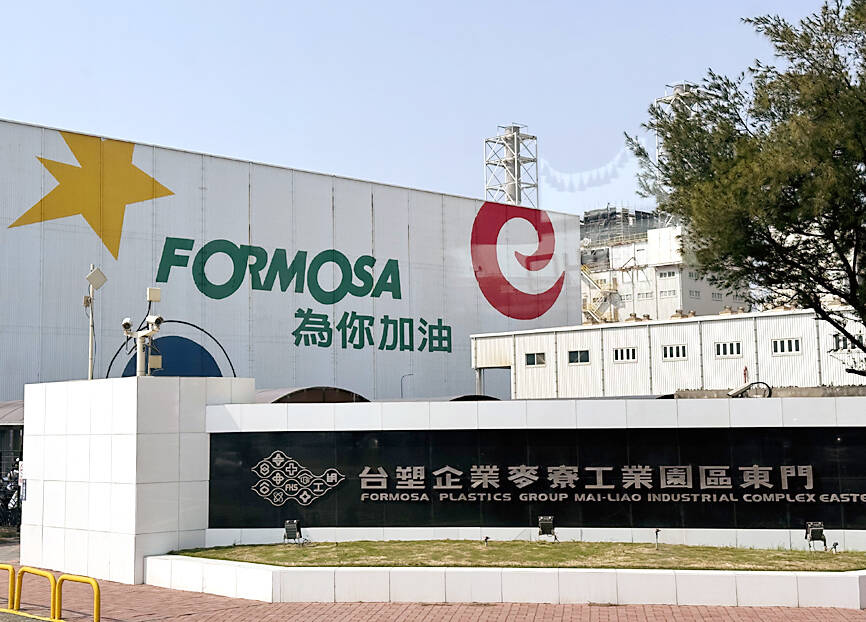Formosa Plastics Group (台塑集團), Taiwan’s largest industrial conglomerate, yesterday posted overall revenue of NT$118.61 billion (US$3.66 billion) for last month, marking a 7.2 percent rise from October, but a 2.5 percent fall from one year earlier.
The group has mixed views about its business outlook for the current quarter and beyond, as uncertainty builds over the US power transition and geopolitical tensions.
Formosa Plastics Corp (台灣塑膠), a vertically integrated supplier of plastic resins and petrochemicals, reported a monthly uptick of 15.3 percent in its revenue to NT$18.15 billion, as Typhoon Kong-rey postponed partial shipments slated for October and last month, it said.

Photo: CNA
The company is expecting a decline in revenue for this month, as it would idle more plants to cope with slack demand.
The financial performance for this quarter might hold steady compared with the previous quarter, without improving next quarter, it said.
The number of working days would decrease in the first quarter of next year due to the Lunar New Year holiday, but utilization rates would rise modestly with the advent of high season, it said.
US president-elect Donald Trump’s protectionist talk might prompt Asian customers to replenish inventory ahead of his inauguration to dodge tariff hikes, it said, adding that the company would be flexible and agile to meet customer demand.
Formosa Petrochemical Corp (台塑石化), engaged primarily in the business of refining crude oil, selling refined petroleum products and producing and selling olefins from its naphtha cracking operations, booked NT$51.24 billion in revenue, up 12.7 percent from one month earlier, as cold weather boosted energy demand but a supply glut weighed on international oil prices, it said.
The company aims to produce 426,000 barrels per day this month, keeping refining capacity at 71 percent and oil cracking capacity at 53 percent for this quarter, it said.
Formosa Chemicals and Fibre Corp (台灣化學纖維), which produces and sells petrochemical products, nylon fibers and rayon staple fibers in Taiwan and abroad, saw its revenue grow 2 percent to NT$27.25 billion on better market diversification practices, it said.
However, sales are set to decline this month, as China fails to emerge from the woods despite the introduction of stimulus measures and peace remains elusive in the Middle East, which is unfavorable for petrochemical products, it said.
Nan Ya Plastics Corp (南亞塑膠), whose main business involves making processed plastic and chemical products, electronic materials and polyester fiber, recorded NT$21.97 billion revenue, a 3.5 percent retreat from October, attributable to the low season and the Thanksgiving holiday in the US, the firm said.
Business would improve somewhat this month but stagnate next quarter due to the Lunar New Year holiday in Taiwan, it said.

Taiwan Semiconductor Manufacturing Co (TSMC, 台積電) yesterday said that its investment plan in Arizona is going according to schedule, following a local media report claiming that the company is planning to break ground on its third wafer fab in the US in June. In a statement, TSMC said it does not comment on market speculation, but that its investments in Arizona are proceeding well. TSMC is investing more than US$65 billion in Arizona to build three advanced wafer fabs. The first one has started production using the 4-nanometer (nm) process, while the second one would start mass production using the

When an apartment comes up for rent in Germany’s big cities, hundreds of prospective tenants often queue down the street to view it, but the acute shortage of affordable housing is getting scant attention ahead of today’s snap general election. “Housing is one of the main problems for people, but nobody talks about it, nobody takes it seriously,” said Andreas Ibel, president of Build Europe, an association representing housing developers. Migration and the sluggish economy top the list of voters’ concerns, but analysts say housing policy fails to break through as returns on investment take time to register, making the

‘SILVER LINING’: Although the news caused TSMC to fall on the local market, an analyst said that as tariffs are not set to go into effect until April, there is still time for negotiations US President Donald Trump on Tuesday said that he would likely impose tariffs on semiconductor, automobile and pharmaceutical imports of about 25 percent, with an announcement coming as soon as April 2 in a move that would represent a dramatic widening of the US leader’s trade war. “I probably will tell you that on April 2, but it’ll be in the neighborhood of 25 percent,” Trump told reporters at his Mar-a-Lago club when asked about his plan for auto tariffs. Asked about similar levies on pharmaceutical drugs and semiconductors, the president said that “it’ll be 25 percent and higher, and it’ll

CHIP BOOM: Revenue for the semiconductor industry is set to reach US$1 trillion by 2032, opening up opportunities for the chip pacakging and testing company, it said ASE Technology Holding Co (日月光投控), the world’s largest provider of outsourced semiconductor assembly and test (OSAT) services, yesterday launched a new advanced manufacturing facility in Penang, Malaysia, aiming to meet growing demand for emerging technologies such as generative artificial intelligence (AI) applications. The US$300 million facility is a critical step in expanding ASE’s global footprint, offering an alternative for customers from the US, Europe, Japan, South Korea and China to assemble and test chips outside of Taiwan amid efforts to diversify supply chains. The plant, the company’s fifth in Malaysia, is part of a strategic expansion plan that would more than triple